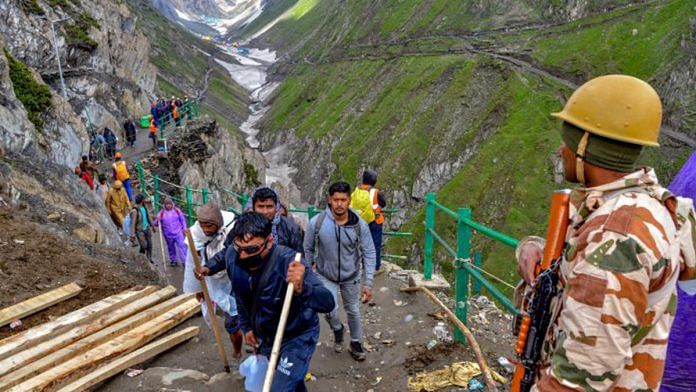New Delhi: Due respect must be given to the principle of separation of powers, the Supreme Court said Monday while dismissing a petition that sought its intervention to cancel or restrict this year’s Amarnath Yatra in Jammu and Kashmir, in view of the Covid-19 pandemic.
A bench led by Justice D.Y. Chandrachud observed it was not proper for the court to “enter the arena of the executive and district administration”.
“The matter as to whether Amarnath Yatra is to be conducted is better left to the local authorities,” the bench said, even though the PIL cited the Supreme Court order that initially barred the Jagannath Rath Yatra in Odisha on 18 June. The apex court later reversed its order on 22 June.
The court was hearing a public interest litigation (PIL) filed by the Amarnath Barfani Langars Organisation, who also wanted the court to allow live telecast of the deity on the internet and television so that “crores of devotees can have access”.
On 5 July, the Jammu and Kashmir administration had announced that it will conduct the Amarnath Yatra in a restricted fashion with 500 pilgrims per day by road from Jammu to the 3,880-metre-high cave shrine.
The 15-day yatra is scheduled to take place in the last week of July.
“Local administration is better equipped to take a decision on the matter,” the bench said, leaving it to the Union Ministry of Home Affairs (MHA) to work out the modalities for the pilgrimage.
Also read: SC upholds rights of Travancore ex-royal family in running Padmanabhaswamy temple in Kerala
‘Recourse to Article 32 is inappropriate’: Court
The PIL, filed through advocate Amit Pai, invoked Article 32 of the Constitution — meant to enforce one’s fundamental right — for seeking the relief.
During the hearing, the petitioner argued that the issue was related to public health as the number of Covid-19 cases in India had nearly crossed the 9 lakh mark.
When asked to make a representation before the authorities, the petitioner claimed it did so but got no response.
“We have come to the court as a last resort.,” the lawyer argued.
However, the court ordered, “Matter must be left to the competence of the local authority, keeping in mind the statutory provisions.”
Furthermore, it noted that in the Jagannath Rath Yatra case, the court had modified its order based on a proposal by the state government.
“We are of the view that recourse being taken under Article 32 is inappropriate. The issue as to whether yatra be held should be left with the local administration,” the bench ordered.
Also read: Can courts impose restrictions on use of social media while granting bail? SC to decide
‘Administrative authorities to bear in mind the relevant statutory provisions’
Arguing against the Yatra, the petitioner submitted that it would not be possible for the pilgrims to adhere to social distancing norms, wear masks and take other steps to prevent transmission of the infection at high altitudes.
The petition also clarified that they were not against the conduct of rituals related to the Yatra and were only seeking limited participation of people from all over the country.
“Right to religion must yield to public health. If the State is permitting a large congregation, it will be in contravention to its own principles. If the virus spreads, who will suffer? My lordships are not powerless to take action,” the petitioner contended.
However, the bench held to its view that it was ill-equipped to determine whether a yatra should be held in a particular terrain or not.
An assessment of the situation on the ground must necessarily be based on local conditions and numerous factors that lie within the domain of the administrative functions of the state, the court said.
Even the safeguards that need to be observed during the pilgrimage should be fixed by the executive, the court said.
“Undoubtedly any decision arrived at must be based on law and all relevant statutory provisions. Administrative authorities are required to bear in mind the relevant statutory provisions including the guidelines (for social distancing),” it ordered.
Also read: Pacts with industry bodies, helpdesks, job schemes: UP tells SC about steps taken for migrants




Dismissing is not enough. Such petitioners should be fined and barred for five years for wasting SC’s time.